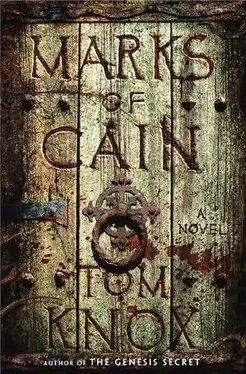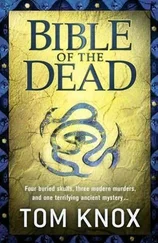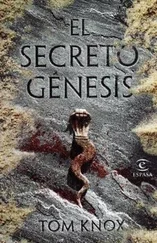Tom Knox - The Marks of Cain
Здесь есть возможность читать онлайн «Tom Knox - The Marks of Cain» — ознакомительный отрывок электронной книги совершенно бесплатно, а после прочтения отрывка купить полную версию. В некоторых случаях можно слушать аудио, скачать через торрент в формате fb2 и присутствует краткое содержание. Жанр: Триллер, на английском языке. Описание произведения, (предисловие) а так же отзывы посетителей доступны на портале библиотеки ЛибКат.
- Название:The Marks of Cain
- Автор:
- Жанр:
- Год:неизвестен
- ISBN:нет данных
- Рейтинг книги:4 / 5. Голосов: 1
-
Избранное:Добавить в избранное
- Отзывы:
-
Ваша оценка:
- 80
- 1
- 2
- 3
- 4
- 5
The Marks of Cain: краткое содержание, описание и аннотация
Предлагаем к чтению аннотацию, описание, краткое содержание или предисловие (зависит от того, что написал сам автор книги «The Marks of Cain»). Если вы не нашли необходимую информацию о книге — напишите в комментариях, мы постараемся отыскать её.
The Marks of Cain — читать онлайн ознакомительный отрывок
Ниже представлен текст книги, разбитый по страницам. Система сохранения места последней прочитанной страницы, позволяет с удобством читать онлайн бесплатно книгу «The Marks of Cain», без необходимости каждый раз заново искать на чём Вы остановились. Поставьте закладку, и сможете в любой момент перейти на страницу, на которой закончили чтение.
Интервал:
Закладка:
The old professor pointed at a couple of the bigger pieces of equipment, and listed their names and functions: the thermocycler for rapid segmentation, the vast lab microwave for sterilization and histology, the DNA sequencers for analyzing fluorochromes. Simon scribbled the strange words and purposes in his notebook; it felt like he was taking dictation in Latin.
Then Fazackerly invited the journalist into a back office, closed the door, and sat down at a desk. Simon sat opposite in a steel chair. A black and white photo of a Victorian-looking man lay flat and dusty on the desk.
Fazackerly nodded in its direction. 'Just taken it down off the wall. It's Galton.'
'Sorry?'
'Francis Galton, bit of a hero. The founder of eugenics. Did some excellent work in Namibia.'
The scientist took up the framed photo and slid it into a cardboard box at his side; the box also contained three empty bottles of whisky.
'Well, Mister Quinn, I imagine you have some questions, like your police friend?'
'Yes.'
'To speed things up, what say I give you a little background?'
'OK.'
Fazackerly began to waffle: about human genetics and the genome project and the problems of funding pure research. Dutifully, Simon scribbled.
But the journalist was beginning to sense what the Scotland Yard detective had been implying: Fazackerly was evasive, filling the air with mellifluous but distracting verbiage, as if aiming to decoy.
He needed to hurry the dialogue along.
'Professor Fazackerly. Why exactly was the GenoMap project closed down?'
The interviewee sniffed the air.
'Because we quite ran out of money, I'm afraid. Genomics is an expensive business.'
'So there was no…political element?'
A flash of the yellow teeth.
'Well…'
Silence.
'Professor Fazackerly. I know you're a busy guy. I'll come clean.' Simon stared directly at the professor. 'I've been doing my Googling. GenoMap was set up mainly with private funding from corporations to continue the work that was begun by the Human Diversity Genome Project at Stanford University. Yes?' 'Yes…'
'Were you closed for the same reason as the Stanford project?'
For the first time the scientist appeared uncomfortable.
'Mister Quinn. Please remember. I'm just a retired biologist.'
'What coaxed you out of retirement?'
'I think GenoMap is a grand idea: we are, or rather we were, aiming to map the differences between different human races…and if we manage that then it could be of momentous benefit.' 'How?'
'Medicines. There are, for instance, new medicines available for people of African descent in the United States for their particular problems with hypertension. And so forth. At GenoMap we were hoping especially for some insights into Tay Sachs disease, which seems to be especially common with people of Ashkenazi Jewish origin…'
'But there were political objections, right?'
An expressive sigh.
'Yes.'
'Why?'
'I suspect you know as well as I do, Mister Quinn. For some people the very idea of there being significant ethnic differences at all is quite anathematic. Many thinkers and politicians like to assert all racial differences are illusory, a social construct. A fable. A chimera. And certainly it's a point of view.'
'One you don't agree with?'
'No. I think young black men can sprint faster than young white men — on average. That's quite a fundamental racial and genetic difference. Of course you're not meant to say these things…' He chuckled mirthlessly. 'But I don't especially care anyhow. I am too old!'
'Fair enough. But a younger scientist?'
Fazackerly adopted a shrewd expression.
'For a young scholar, yes, it is different: it could be seen as career-suicide, getting into this kind of thing. It is very controversial. Koreans are better at chess than Aborigines and so forth! Eugenics died as a science after the Second World War, for obvious reasons. And it has proved very hard to revive the study of racial differences. The HDGP at Stanford was a start, but the politicians got it closed. After that many decided to avoid the field of human genetic diversity altogether. And of course, there are the endless lawsuits, as well…'
'The biopiracy?'
'You have done your homework.' Fazackerly's expression was almost wistful. 'Yes. You see, during our research we aimed to analyze the DNA from isolated tribes and races, like Melanesians, and Andaman islanders.'
'Why?'
'Because, like rare Amazonian plants, rare races of men might have uniquely beneficial genes. If we found an isolated Congolese tribe that is genetically resistant to malaria we could then have a shortcut to a genetically-based malaria vaccine.'
Simon wrote in his pad.
'Yet the tribesmen objected. And sued. Because it's their DNA?'
'Quite so. But then again, the hunter-gatherers of the Kakoveld have not done all the expensive research.' Fazackerly shrugged, impatiently. 'Anyhow some Australian native groups sued us for biopiracy, and that put the poison cherry on the already rather inedible cake for our main patrons. The Greeler Foundation, Kellerman Namcorp, and so on. They pulled the plug. And that was the end of GenoMap.'
Fazackerly gazed out of the window.
'Such a shame for the staff. We had some great people here. A fiendishly clever girl from Kyoto University. And a quite outstanding Chinese Canadian. And of course…'
They looked at each other. The journalist said:
'Angus Nairn.'
'Young Angus Nairn. Perhaps the best young geneticist in Europe. He had already published some quite startling papers.'
'But…then he disappeared?'
'After we were closed down. Yes.'
'Why?'
'I have no idea.'
'You have no idea where he's gone, or why? Or where?'
'No.' Fazackerly shrugged. 'I did wonder if he may have ended his life, like a good Socratic. The figures for suicide in young men are quite alarming. Personally I suspect he was too…ambitious…to throw himself off Tower Bridge.' The yellow smile was notably sad. 'It is an authentic mystery. I am sorry. I cannot help.'
'But what about the connection with these…murders? You said on the phone you'd read my articles. So you know this. Angus Nairn was testing Basques just before he disappeared.'
'The Basques are of tremendous genetic interest.'
'But, coincidentally, one of these Basques was recently murdered. A woman called Charpentier…'
The lab was silent. Fazackerly suddenly stood, and asked:
'Look, I do have a theory. About Nairn. But I don't have much more time to talk with you. So. Can we step into the square?'
'Whatever you wish.'
'Good. Maybe I can show you something there — something that will explain the concept.'
The two men turned and walked out of the now deserted laboratories; the mellow autumn sunshine magnified the emptiness of the rooms.
Fazackerly's stride was brisk for an old man. He led his guest down the steps and out of the building, across the unbusy road, through the wire gates and into the Septembery green and gold of Gordon Square Gardens. Students, tourists and office workers were taking lunch on the lawns, eating sandwiches from clear plastic packets, chopsticking sushi from little plastic trays. The faces of the lunchers were white and black and all other possible shades.
This, Simon thought, was London at its very best: the best hope of the world. All races coming together. And yet all the time people like this lizard Fazackerly were trying to divide humanity up, once again: put them in different boxes, make everyone mistrust each other all over again.
Simon could see why people would object. It felt wrong and depressing: racially parcelling the world. And yet it was just science, and science that could save lives. The paradox was complex. And challenging.
Читать дальшеИнтервал:
Закладка:
Похожие книги на «The Marks of Cain»
Представляем Вашему вниманию похожие книги на «The Marks of Cain» списком для выбора. Мы отобрали схожую по названию и смыслу литературу в надежде предоставить читателям больше вариантов отыскать новые, интересные, ещё непрочитанные произведения.
Обсуждение, отзывы о книге «The Marks of Cain» и просто собственные мнения читателей. Оставьте ваши комментарии, напишите, что Вы думаете о произведении, его смысле или главных героях. Укажите что конкретно понравилось, а что нет, и почему Вы так считаете.












